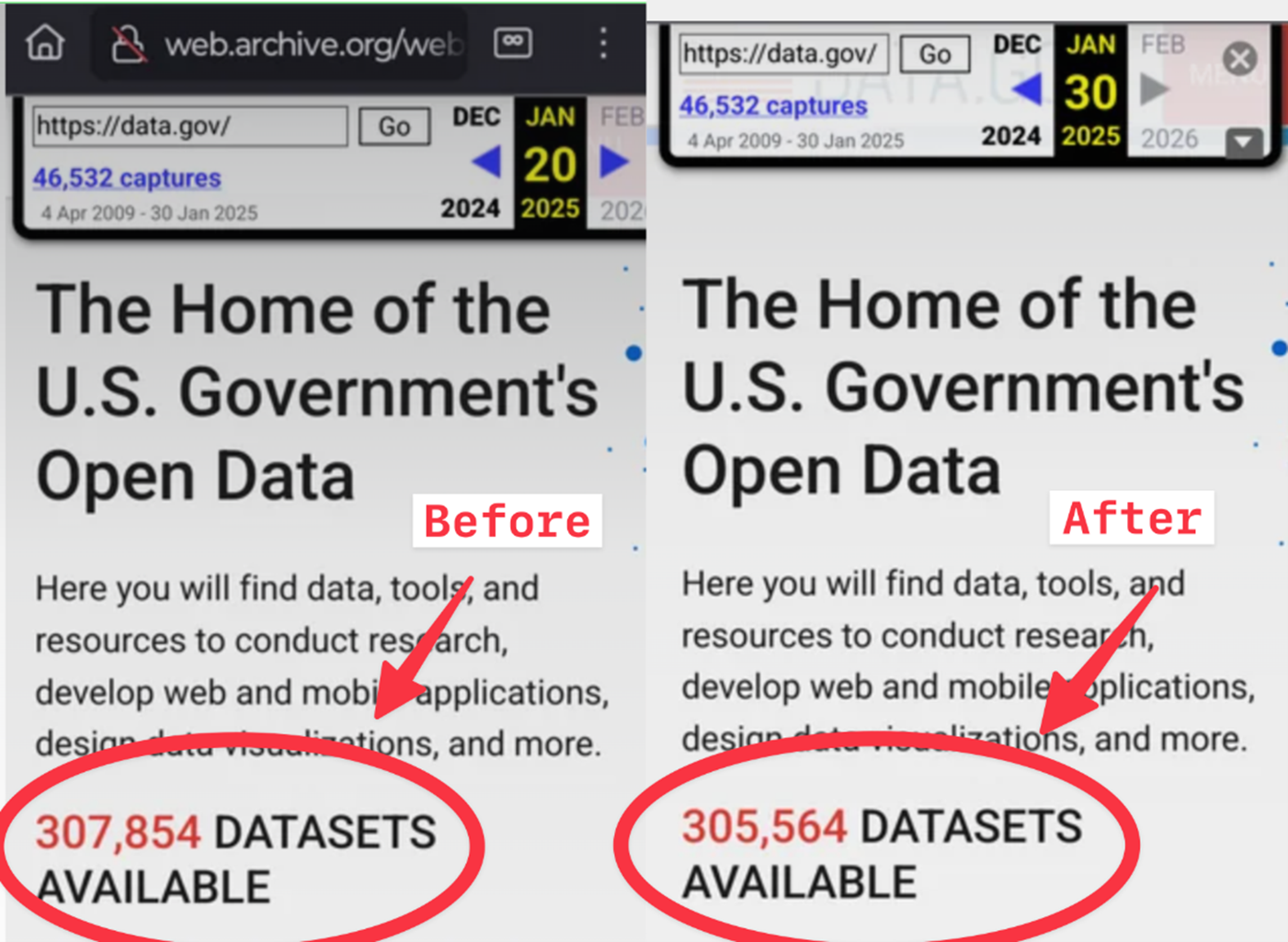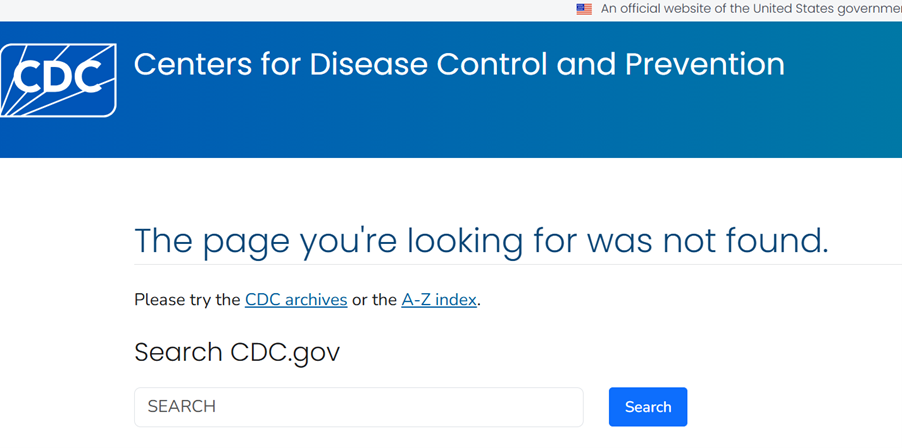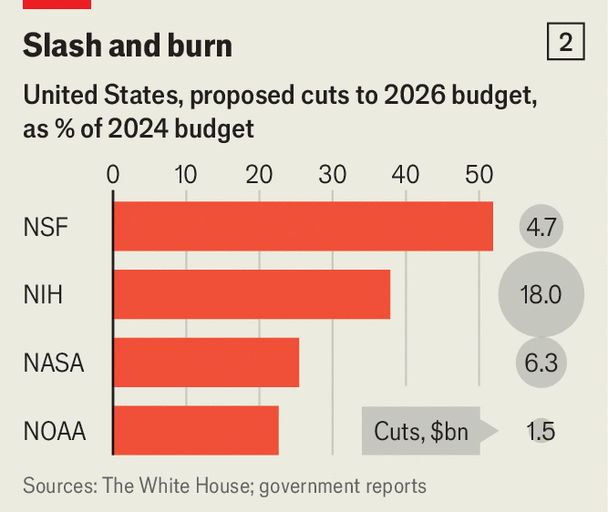Is Trump Silently Attacking the Nation’s Knowledge Bank?
Trump and his Attacks on Education and Knowledge
Related Articles: Reproducibility Crisis in Research, Basic Research: the Engine of Innovation, and Trump vs Harvard.
Trump Signs Executive Order to Dismantle Education Department
In early 2025, the Trump administration quietly began erasing vast swaths of public information from federal websites and databases. Observers report that thousands of pages and datasets – the very “knowledge bank” underpinning policy and research – have simply vanished. Analysts at the Brookings Institution note that the purge swept up “taxpayer-funded data and statistics” on topics ranging from crime and climate to education and gender. In practice, researchers say, every time they search for key federal statistics or historical reports, they find an error message or missing file instead. The result is a sudden void in government data that experts warn will hinder evidence-based decision-making and accountability.
While this information may not all be government data and not the data that was purged, evidence suggests many people are using data from and about the government.
Broad Government Data Purges
The removals began almost immediately after the inauguration. Within weeks, entire sections of agency sites were deleted or archived with no public notice. For example, the Census Bureau’s page on sexual orientation and gender identity was pulled offline, and even the CDC’s main health data portal was temporarily taken down, replaced with a banner noting it was being “modified to comply with President Trump’s Executive Orders.”. Federal researchers compared the scramble to a “five-alarm fire” – once-hidden datasets suddenly disappeared, triggering “a mad scramble…to grab copies of whatever federal data was posted before”. Even after some pages were restored (often stripped of key columns or documentation), analysts say it is still unclear what has been altered or lost entirely.
Notably, the purge extended well beyond the explicit targets of the early executive orders. One White House order on “gender ideology” directed agencies to remove references to gender identity and transgender issues; another demanded the end of “diversity, equity, and inclusion” (DEI) programs. But by late January, data on many unrelated topics had been taken offline. Surveillance tools for infectious diseases, social science surveys, and climate datasets all disappeared alongside the pages clearly flagged under the orders. As one Georgetown University expert put it, workers went looking for routine reports and “it’s just not there”.
Picture of datasets being purged under Trump. This picture was produced by NSA archive.
Climate and Environmental Data Removed
Among the hardest-hit areas was environmental science. Inside Climate News reported that even NASA’s public climate portal was being rebranded: the URL dropped the word “climate,” hinting at a downplay of climate issues. A University of Hawaiʻi climate researcher found that planned White House Office of Science and Technology climate reports, for example on ocean carbon cycle research, were no longer accessible. The researcher warned that removing these resources would disrupt U.S. collaboration on global climate research: “If those websites disappear, or if those policies change, we may not have the data or funding to pull off our international collaborations”.
Likewise, other federal environmental datasets vanished. The Environmental Protection Agency’s climate adaptation and resilience pages were reportedly wiped from the homepage, and NOAA’s budget proposal cut nearly all climate-related funding (including eliminating the agency’s climate programs). In effect, the administration has censored large portions of the official climate record. Without ready access to the archived science, state governments and environmental planners lose critical information they previously relied on – an outcome climate scientists have described as a “targeted attack” on climate research.
Health Agencies and Civil Rights Resources Scrubbed
A search of the CDC’s website on healthy youths https://www.cdc.gov/healthy-youth/lgbtq-youth/index.html) on 1/31/2025 came up with this message. From Clinical Advisor
Federal health and science agencies saw similar purges. NPR and other outlets documented that HHS and its sub-agencies (like the CDC and NIH) removed pages on topics from HIV testing to LGBTQ+ rights. For instance, CDC webpages on LGBT health and HIV surveillance were taken down, along with an NIH Office of Gender Minority Research page. Also deleted were CDC data tools such as AtlasPlus (tracking HIV, hepatitis, STDs, and tuberculosis) and the Social Vulnerability Index (a community resilience metric). The youth health survey site (the CDC’s 35-year-old Youth Risk Behavior Surveillance System) was pulled offline, erasing decades of data on teen nutrition, substance use, sexual behavior, and more. This prompted shock from public-health experts. As University of Texas sociologist Stephen Russell put it, erasing those adolescent health data is “stunning,” since the survey is “the way the nation understands adolescent health”.
These moves align with new policy directives. The White House’s January orders demanded agencies stop offering “gender identity” options on forms and end funding tied to “gender ideology,” as well as terminate all “wasteful” DEI programs. Under those directives, HHS systematically removed what it deemed problematic content, often without warning. One infectious-disease society criticized the changes, warning that stripping “HIV- and LGBTQ-related resources from…health agencies is deeply concerning and creates a dangerous gap in scientific information” needed to monitor and respond to disease outbreaks. In short, information vital to both marginalized communities and healthcare professionals has been deleted or buried under new policy rubrics.
Education Research and Statistics Slashed
The education sector was not spared. Trump’s new Department of Government Efficiency (DOGE) at Education canceled nearly $900 million in contracts with the Institute of Education Sciences (IES) – the core data agency that tracks student achievement and school outcomes. Advocates warn this effectively “dismantles a core research arm responsible for tracking student progress and informing educational policy”. Dozens of ongoing studies on literacy, math, and other learning metrics were halted, and data collection on student performance was abruptly ended. In the words of one library advocate, this cut “disrupts ongoing research” and “ends the collection and dissemination of accurate data,” which raises the question of “why the administration is choosing to diminish our nation’s visibility into the quality and impact of our schools”.
Beyond K–12, even academic research on campus has faced pressure. Private universities have seen multi-billion dollar freezes on federal research funding for refusing political demands on hiring or curricula. Some institutions have capitulated to avoid cuts, only to face new demands. Others, like Harvard and others, have announced legal challenges to protect their academic independence. Meanwhile, career research staff and faculty report an atmosphere of intimidation, fearing that certain topics (from systemic racism to environmental justice) may be off-limits if they contravene the administration’s ideological agenda.
DEI Programs and Equity Initiatives Targeted
Alongside data cuts, the administration has waged an explicit campaign against diversity programs. In January 2025, the Department of Education published a press release detailing broad actions to “eliminate harmful DEI initiatives.” It boasted that over 200 web pages containing DEI resources for schools were identified for removal. The department also disbanded its Diversity & Inclusion Councils, paused DEI training contracts, and effectively banned any mention of equity initiatives on official channels. Similar directives have flowed through other agencies under new executive orders. The result is that not only research data, but also guidance and programs aimed at improving diversity and rights, are being erased from the public record or shelved.
Critics note that the DEI purge reaches even everyday informational sites. For example, the HHS Office for Civil Rights’ FAQ on LGBTQ patient rights was taken down, and official definitions of “sexual orientation” were ordered removed from federal publications. In effect, textbooks of policy and inclusion are being sanitized of any references seen as “gender ideology” or equity-focused. The combined health, education, and civil-rights data purge is unprecedented in scope, prompting many observers to draw analogies to authoritarian censorship.
Implications for Science and Policy
Many large organizations responsible for both funding research and disseminating data and information are the biggest targets for DOGE and other cost cuts. From the Economist.
Experts warn that these deletions have deep implications. Government statistics and datasets are considered a public good – tools of accountability and planning. When asked about the purge, analysts emphasize that “the collection and dissemination of timely and accurate data fuels research across the nation,” and that interrupting those processes “carries a profound cost” in delayed policies and weakened programs. In practical terms, the loss of data means that policymakers and scientists will lack the evidence needed to measure everything from poverty and education outcomes to disease trends and environmental risks.
As the Brookings economist Caren Grown (a former World Bank official) explained, reliable federal data underpin basic policy decisions both at home and abroad. They help ministries allocate healthcare and education resources, track progress on global goals, and inform the public about societal trends. If core datasets vanish or are altered, those functions are jeopardized. One population statistics expert put it bluntly: the U.S. federal statistical system is “the best in the world,” and having the administration delete entire categories of census or health data can undermine public trust in the information.
There is also a chilling impact on research culture. Scientists worry that if agencies can arbitrarily remove data, then research across fields will suffer. For example, a Duke university researcher noted that his work on grid modernization was scrubbed from the Department of Energy website after becoming entangled in policy fights. Similarly, the Smithsonian and other research institutions have reportedly been told to align exhibits with political lines. In short, the clear implication is that the administration views knowledge itself as something to be managed – and, if necessary, purged. This threatens to skew policy debates by privileging ideology over facts.
Response and Pushback
The pushback behind Trump’s deletion of data likely comes from people who believe that the government uses the data for good. At the same time, Trump’s target audience for removing data includes people who are already skeptical of government overreach.
The public reaction has been swift and critical. Thousands of scientists, health professionals, and policy analysts have denounced the data deletions. Professional organizations issued statements calling the removals “unacceptable” and demanding that the data be restored. For example, the Association of Public Data Users described the situation as a national emergency that must be reported to Congress. A CDC advisory committee has formally requested meetings with agency leaders to get answers about why key health datasets were made inaccessible.
Meanwhile, advocacy groups have taken matters into their own hands. The American Sexually Transmitted Diseases Association, for instance, published CDC STD statistics and treatment guidelines on its own site after downloading them from the agency before they disappeared. Epidemiologists pointed out that “taxpayers paid to collect those data… to make them public” and that evidence-based care cannot depend on political whims. Librarians, educators, and statisticians are also banding together to mirror and archive threatened data online, effectively building parallel repositories to safeguard information if official sources vanish. Congressional Democrats have launched inquiries, and some are drafting bills to protect federal data from political interference.
Legal challenges are likely as well. Government watchdogs note that affected parties – from university researchers to state health departments – could resort to Freedom of Information Act lawsuits to force agencies to disclose what was deleted or at least explain the removals. (Already, private suits are underway over the funding freezes at universities.) In public hearings and press conferences, experts have emphatically warned that this data purge is a form of censorship. One statistical official declared that stripping out scientific facts “should alarm you” because it means Americans no longer have guaranteed access to information their taxes paid for.
Risks and Long-Term Consequences
If allowed to continue, the knowledge purge risks inflicting lasting damage on American science and governance. Without solid data, policy becomes guesswork. Programs to fight epidemics, reduce poverty, or address climate change all rely on accurate measurements of trends and outcomes. Removing that baseline information could send us backward, making it harder to evaluate progress or diagnose problems. As one observer warned, success in this campaign would effectively “plunge America into a new Dark Age” of ignorance, where myths and ideology fill the void left by hard facts (though we did not use this quote to avoid overly dramatic language, the sentiment echoes expert concern).
Moreover, the purge undermines democratic accountability. Voters and civic watchdogs depend on transparency – on knowing what programs exist, how much is spent, and what results are achieved. Erasing data on public schools, health programs, or demographic trends breaks that social contract. Even if some information is later restored, the precedent is set: any future administration could similarly delete whichever inconvenient truths emerge from the data. As Paul Schroeder of the Council of Professional Associations on Federal Statistics warned, the takedowns “go against everything the statistical agencies stand for,” leaving ordinary Americans “in the dark” about their own communities.
In sum, what began as discrete orders to eliminate “divisive” language has morphed into a sweeping assault on evidence. From climate to coronavirus to curriculum studies, the Trump administration’s purge of the nation’s knowledge infrastructure threatens to hobble informed policymaking. The consequences will depend on how far the public and institutions will push back – and on whether future leaders will restore or even expand these vital data resources. For now, scientists and citizens are racing to save the fragments of knowledge left behind, knowing that today’s missing pages could determine the country’s future trajectory.
Notes: This is my own opinion and not the opinion of my employer, State Street, or any other organization. This is not a solicitation to buy or sell any stock. My team and I use a Large Language Model (LLM) aided workflow. This allows us to test 5-10 ideas and curate the best 2-4 a week for you to read. Rest easy that we fact-check, edit, and reorganize the writing so that the output is more engaging, more reliable, and more informative than vanilla LLM output. We are always looking for feedback to improve this process.
Additionally, if you would like updates more frequently, follow us on x: https://x.com/cameronfen1. In addition, feel free to send me corrections, new ideas for articles, or anything else you think I would like: cameronfen at gmail dot com.









